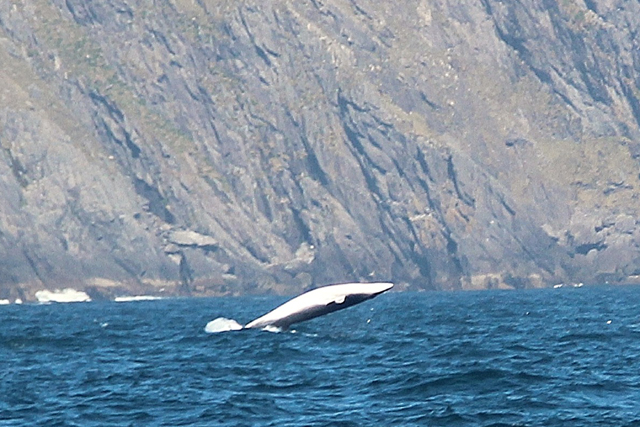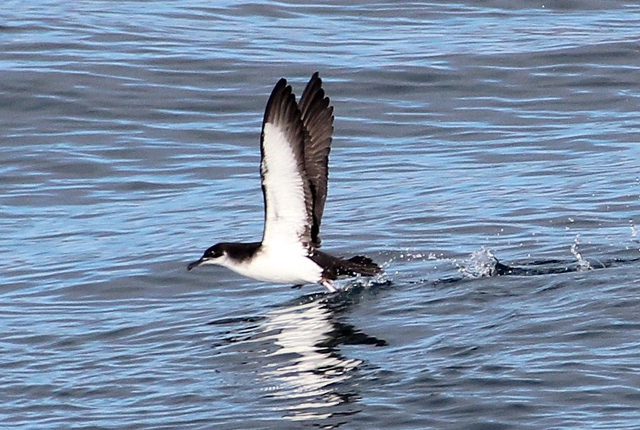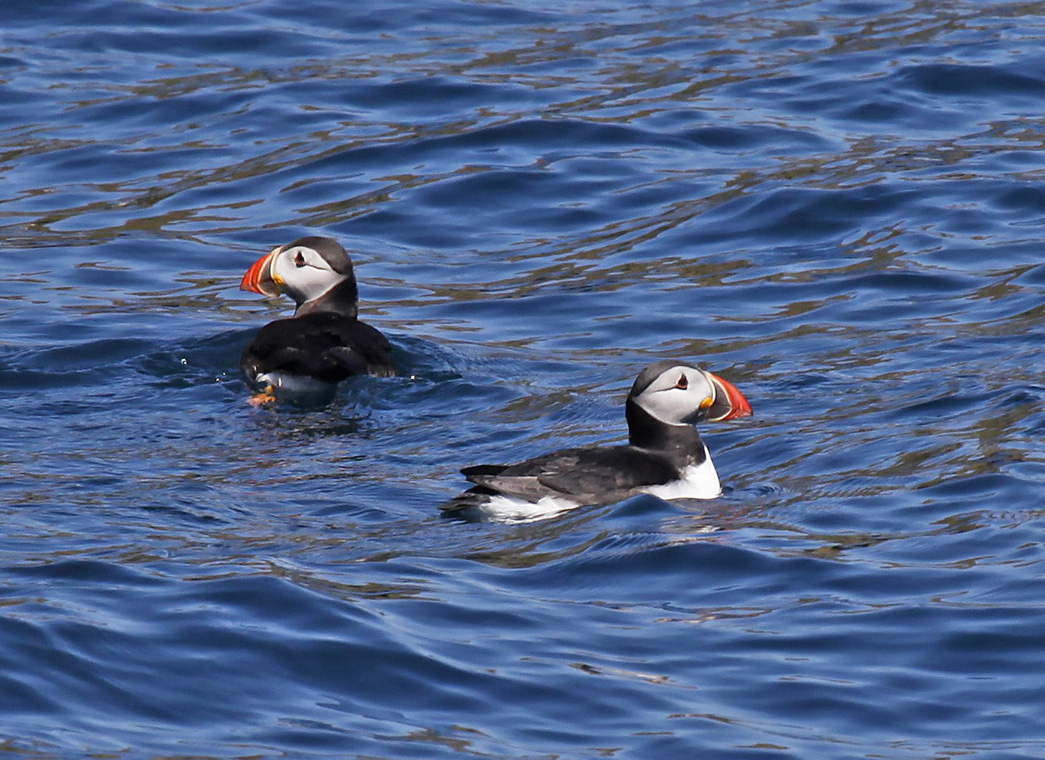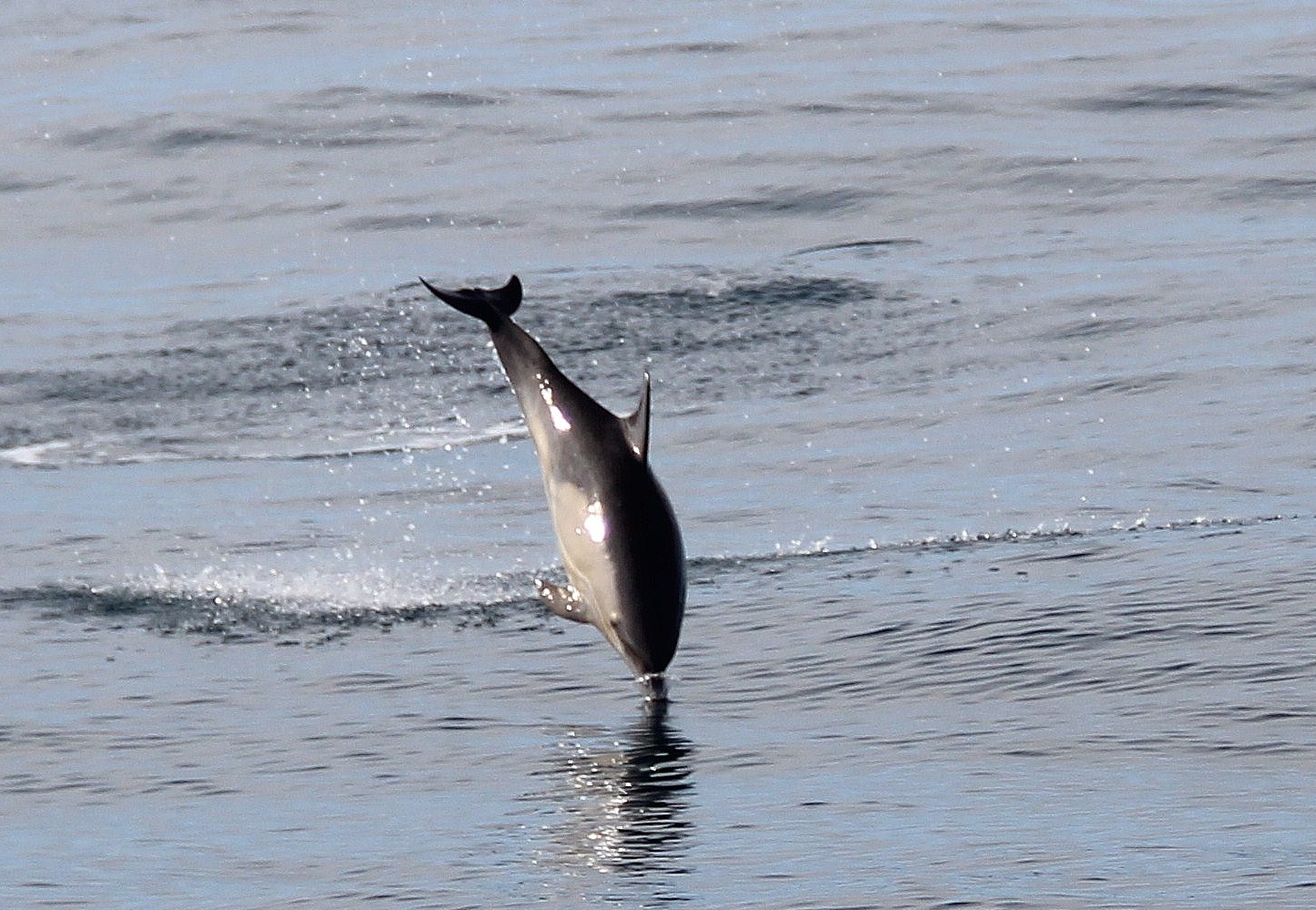2015 whale watch season in Ireland

Breaching minke whale off Great Blasket
Common dolphin nose-diving

Manx Shearwaters returning to Blasket Islands

Blasket Island puffins back for 2015 breeding season
Video
April 13th, 2015 Whale watch season in Ireland, whale watching, dolphin watching and bird watching around Blasket Islands, Dingle Peninsula, Kerry, Ireland S.W.
Happy Days! The 2015 dolphin and whale watching season, as well as the bird watching season - especially for the ever popular puffins - has started around the beautiful Blasket Islands and Dingle Peninsula, Co. Kerry, Ireland S.W.
Blasket Islands Eco Marine Tours have started their wildlife boat tours with the good ship "Blasket Princess" and as always, the eco marine tours at the start of the season - April / May- are proving very productive as the water is quite rich in spring plankton blooms and accompanying shoals of small fish and fry feeding near the surface.
On one memorable day there were literally hundreds of common dolphins in Dingle Bay and the fish finder on board was showing large shoals of fish near the surface, probably sand eels [which are not true eels but lance fish which bury themselves in the sand ] coming towards the surface to feed on the abundant plankton.
The sight of the season so far has been a breaching Minke whale, breaching beside the boat about one nautical mile south of the Great Blasket Island on the afternoon boat tour. The breaching Minke was first spotted by one of our visitors and breached a total of about sixteen or eighteen times in two bursts of eight to nine breaches per period over the space of about eight minutes. We wonder is this a record for the number of consecutive breaches recorded for a Minke whale in Irish waters? Please check out www.facebook.com/ecomarinetours for photo and description.
Puffins and Manx shearwaters, abundant sea birds around the Blaskets
Next in the spectacular list after the breaching Minke whale for the start of the 2015 dolphin and whale watching season, and apart from the ever present schools of common dolphins throughout the Bay, was a day on which we did not see any dolphins but instead saw thousands of Manx shearwaters. These birds come all the way from Brazil and Uruguay to breed on the outer islands of the beautiful Blasket Islands and only come in to land at night in the dark as the Great Black-back gulls are waiting to prey on them. Because they are such a specialised maritime seabird their legs are very far back on their body and they are relatively helpless on land and can only take off from a cliff or by clambering up on a rock. It's a hard life for breeding seabirds and they deserve our protection. Despite the iconic status of puffins, these shearwaters are our favourite birds as they shear the waves alternatively showing their all black backs or their all white undersides, as they shear and turn and glide inches above the waves.
Large "rafts" of puffins are present on the outer Blasket Islands under the cliffs of Inishvickillaun and Inish na Bró below their nesting sites. They have come all the way from the east coast of Canada and Newfoundland and from the mid Atlantic area where they feed on capelin during the winter period, to nest here in disused rabbit burrows and underground chambers which they excavate with their beaks and feet. They nest here among herring gull and fulmar petrel and higher up the slopes nest the Great Black-back gulls which also prey on them probably picking off the weakest and most careless. Shortly, in late April or early May the female will lay one egg which incubates after about siix weeks and then the chick is fed by both parents until it is nice and plump and fat and then it is abandoned! After a day or two the young chick takes the plunge over the side of the cliff into the water in an amazing apprenticeship of learning to fly and swim/ dive on the one day! What an extraordinary little bird!
Please take one of our trips before the end of July if you want to see one of these wonderful little birds as they are one of the first of our summer visitors to migrate [one tagged on Puffin Island, Co. Kerry which is about 12 miles south of the Blaskets in Dingle Bay was recorded ten days later off the coast of Canada!].
Basking Shark season is approaching for the next 5/6 weeks
But there is something missing ....... something dark and mysterious from the deep......... often persecuted.........much misunderstood.......... the basking shark ( Cetorhinus maximus).
This year is unusual in that sightings of basking shark are being reported from further north and further south than the area covered by our boat trips but we are confident with the surface sea water temperature approaching 12 degrees Celsius that it will not be long before we have plenty of basking sharks around the Blasket Islands and Dingle Bay, Co. Kerry, Ireland.
They will only be present and abundant here for a period of about 5/6 weeks from their first appearance so if you want to see these (gentle) monsters of the deep then why not book a boat trip on one of our boat tours over the next few weeks to view the biggest fish in the North Atlantic and the second biggest fish in the world after the whale shark. These unique mega fauna have survived not only shark finning ( for shark fin soup) in the oceans but also were formerly hunted inshore in Ireland for their livers which are approx. one third their body weight as they filter the equivalent of an Olympic sized swimming pool of sea water through their mouth rakes as they feed. They formerly provided many barrels of liver oil for industrial use before the discovery of the black stuff - crude oil in Texas - which also incidentally saved the whales from being hunted to extinction.!
Book a Tour on one of our boat trips over the next few weeks if you want a chance to see the biggest fish in the North Atlantic and the second biggest fish in the world after the whale shark.
There definitely be monsters out there! Come along and have a look at these mega mouth behemoths from the Deep!!!
Captain Whales Galore 13.04.2015
















